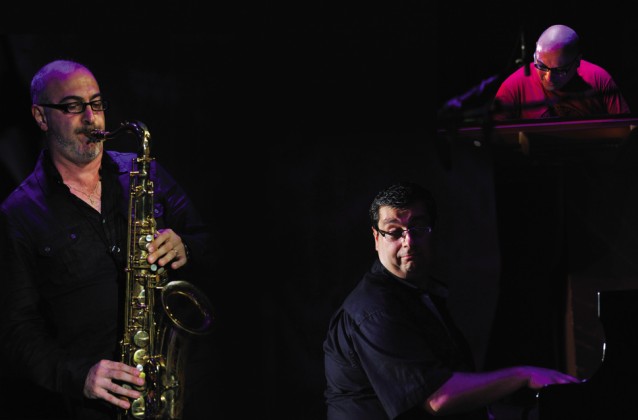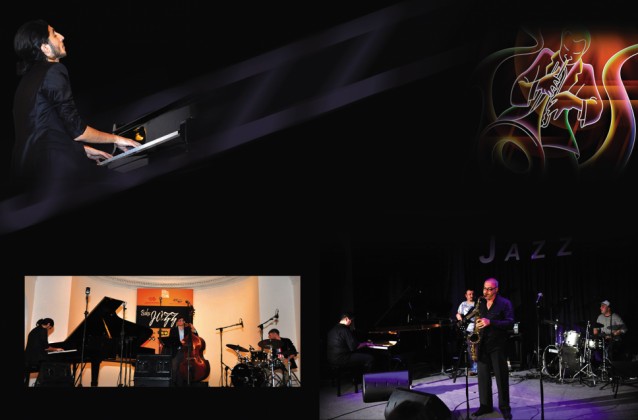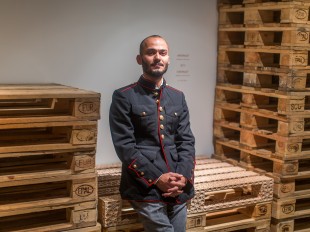The opening day was typical of the mix; Mike Stern, veteran of Blood Sweat and Tears, a Miles Davis group, the Breckers and most lists of best guitarists, delighted a packed Mugham Centre with a virtuoso set. Much of that audience then crossed the city centre to see what Tofiq Jabbarov had in store at the Jazz Centre. Apart from his ever-expanding collection of strikeable steel, wood, skin and plastic, the restlessly energetic percussionist had also assembled a group of newer faces on piano, keyboards, saxophone, drums... and vibraphone, about which, more later. Tofiq’s perpetual enthusiasm guarantees an uplifting experience and the beat, pace and smiles were never in danger of slackening as he drove his younger charges through a set of exhilarating rhythm. And there was still energy left for the traditional nightly jam session!
Pianos to the fore
Grammy-winning Cuban-US pianist Gonzalo Rubalcaba’s trio drew an appreciative capacity audience to the Philharmonia and he played to suit the environment – an elegant, lyrical set which, however expert, left these reviewers wishing for a little shake of a Cuban hip to liven the rather academic American influence.In contrast, the Greek pianist Yiorgos Psihoyios broke with his classical traditions and the economic gloom in his homeland to deliver a pure solo concert which impelled a response from the Jazz Centre faithful. A rolling thunder of a left hand did the work of bass and drum while the right seemed naturally to gravitate to the blues, mixing upbeat jaunty with head-down examinations of the soul contained in each key at the top end of the board. Following the gentle Autumn in Baku, Attic Blues and Melancholic Blues communicated a fellow-feeling which overcomes the woes of the world. When he came to the close with an affectionate version of Manos Hadzidakis’ Never on Sunday, the regrettably small audience (the Glenn Miller Orchestra was playing at the same time in the Heydar Aliyev Palace) was swept up in a romance that proved to be highly emotional for the Greeks present.
Elchin Shirinov, 24 years old but already a much-respected regular on Baku’s jazz scene, teamed up with Polish vocalist Grzegorz Karnas, whose mobile voice is both instrument and expresser of thoughts from a lively mind. Elchin seems to prefer collaboration over fronting a group and he has become a highly sympathetic and supportive pianist, well capable of contributing thoughtfully-constructed solos. Will he develop as a leader?
Georgian Rain
Rain Sultanov was another to divert from an established course, playing a refreshing interlude with a Georgian trio: David Mazanashvili (piano), Levan Deisadze (bass guitar) and drummer Zaza Tsertsvadze. As the trio opened it was clear we were in for a different experience from the powerful introspection marking Rain’s recent direction. The opening number also indicated their democratic arrangement. Deisadze’s bass was no backroom boy as his finger work over the frets easily matched the energy and impact of piano and drums. Rain entered the stage and spirit for the third number and seemed as relaxed as he’s been for some time, with some happy solos. A slower piece had Deisadze proving he could play the more traditional role, too, even resorting to sheet music. And there was some nostalgia as Rain recalled beautiful Baki Khatireleri (Baku Memories) from his City of Jazz album – wonderfully lyrical. But the prevailing mood was of the rumbustious enjoyment of life associated with Georgians and the excellent collaboration, with Rain proving that you don’t have to blow your brains out to create upbeat energy, was well-received by a full house at the Jazz Centre. This was a spirited sidetrack for Baku’s most intriguing saxophonist and it will be interesting to see where he goes next.Mixed palette
It’s hard to believe that Isfar Sarabski has just turned 23, such is his established presence on the local and European jazz scene. Of course his 2009 piano competition victory at Montreux brought him international recognition, but the reason his hometown concerts sell out is simply that people know they will get a thrilling night of some combination of the new, the traditional, classical, jazz, mugham, pop, cartoon... Cartoon? Well he has previously improvised on the theme music for Nu Pogodi (Just You Wait!) a popular Soviet Russian series, something like the west’s Road Runner. But he opened his festival concert at the (naturally) full Philharmonia with his version of the theme for The Simpsons. That the evening’s playlist also included Swan Lake and Over the Rainbow will give some idea of the variety. In fact, the programme was not quite as advertised; the lightning-fast fingers of Natiq Shirinov had been due to accompany Isfar on the nagara (double-headed drum) but illness intervened and Aleksandr Mashin’s quartet filled the gap. Isfar tried out a couple of new pieces in the first half, but the group seemed somewhat under-rehearsed and Mashin’s robust drumming was occasionally too much for the Philharmonia’s refined acoustics. A rendition of Till There Was You was fronted by singer and trombonist Alevtina Polyakova and the vocals, it has to be said, were a real disappointment. The effect even clipped the wings of the Swan Lake that followed – usually one of the highlights of Sarabsky’s current repertoire. It sometimes appears that Isfar is too nice for his own good; he must insist on his own musical standards. Thankfully an interval gave time for recovery; the second-half opener saw the pianist diving into the guts of the piano to produce some extra tones to a tense, even menacing piece. By contrast we were then borne on wistful keys to an enchanted place somewhere Over the Rainbow, especially happy that the pianist was fully back on track. A brief excursion on melodica preceded a driving finale and the inevitable encore was his own G Man, rousing the night off to a standing ovation. The concert had its ups and downs but the mix was heartening, as were the indications of additions to the repertoire. We just hope that Isfar can withstand all those who call in favours and can maintain his own direction.Home ground
Born of Turkish parents in Germany but now resident in the Netherlands, Esra Dalfidan was clearly at home among Azerbaijanis and sang her concert with clear reference to her familial roots. Singing sometimes in Turkish, occasionally in English and other times scatting, the words always seemed secondary to sound and mood, which was mainly gentle, wistful and longing. Her band: piano, double bass, drums and bass clarinet added energy and (sometimes quirky) variety to a pleasant evening.The festival rounded off with a concert by relatively new faces on Baku’s jazz scene. Apart from veterans Ruslan Huseynov (bass) and Rafael Bunyatov (rock guitar) there were the promising Afgan Rasul on piano, Elvin Bashirov on drums, Ali Vezirov on vibraphone and, leading the way, Zaur Mirzeyev on saxophone. Catching the ear of many locals was the first local vibes player in living memory. We intend to catch up with and learn more about Mr Vezirov in the near future, so for now we’ll just say he’s worth more than just a second hearing. As for Zaur Mirzeyev’s sax, he clearly knows his way up and down the keys, but he did rely overmuch on volume and stamina to make his point; there was a sameness about the solos that left one wishing for understatement. Still, the guys were obviously out to give the festival audience a good send-off and it was a lively, upbeat evening.
Misses and hits
A festival as plentiful as this one always means that hard choices have to be made; time and depth of pocket come into play. These reviewers missed out on some of the bigger names, either because they’d heard them before or the acts are generally more accessible by other means. We are sorry to have missed Mike Stern – work commitments blamed – after the reports we had from friends; the Glenn Miller Orchestra and Kool and the Gang were in the familiar category and the other seven concerts fell victim to the first law of economics (you can’t spend what you haven’t got unless you desire a crisis). This time round we caught a few very good international performers but in the end the main pleasure came from the home-grown acts, green and seasoned, who more than held their own, proving that the talent is definitely here.This festival, organised variously over the last decade or so by an American NGO, the capital’s Jazz Centre and latterly by the Ministry of Culture and Tourism and the Azerbaijan Culture Foundation, has been one of the most intriguing over recent years. World stars of the stature of Herbie Hancock, Al Jarreau and Joe Zawinul have featured alongside a line of gifted youth emerging from the home country’s strong musical tradition; even rap and rock, albeit less successfully, have taken the stage. This year’s festival, over ten days in October, was somehow lower key but all the more intimate and none the less exciting for the combination of local and international talent.The opening day was typical of the mix; Mike Stern, veteran of Blood Sweat and Tears, a Miles Davis group, the Breckers and most lists of best guitarists, delighted a packed Mugham Centre with a virtuoso set. Much of that audience then crossed the city centre to see what Tofiq Jabbarov had in store at the Jazz Centre. Apart from his ever-expanding collection of strikeable steel, wood, skin and plastic, the restlessly energetic percussionist had also assembled a group of newer faces on piano, keyboards, saxophone, drums... and vibraphone, about which, more later. Tofiq’s perpetual enthusiasm guarantees an uplifting experience and the beat, pace and smiles were never in danger of slackening as he drove his younger charges through a set of exhilarating rhythm. And there was still energy left for the traditional nightly jam session!
Pianos to the fore
Grammy-winning Cuban-US pianist Gonzalo Rubalcaba’s trio drew an appreciative capacity audience to the Philharmonia and he played to suit the environment – an elegant, lyrical set which, however expert, left these reviewers wishing for a little shake of a Cuban hip to liven the rather academic American influence.In contrast, the Greek pianist Yiorgos Psihoyios broke with his classical traditions and the economic gloom in his homeland to deliver a pure solo concert which impelled a response from the Jazz Centre faithful. A rolling thunder of a left hand did the work of bass and drum while the right seemed naturally to gravitate to the blues, mixing upbeat jaunty with head-down examinations of the soul contained in each key at the top end of the board. Following the gentle Autumn in Baku, Attic Blues and Melancholic Blues communicated a fellow-feeling which overcomes the woes of the world. When he came to the close with an affectionate version of Manos Hadzidakis’ Never on Sunday, the regrettably small audience (the Glenn Miller Orchestra was playing at the same time in the Heydar Aliyev Palace) was swept up in a romance that proved to be highly emotional for the Greeks present.
Elchin Shirinov, 24 years old but already a much-respected regular on Baku’s jazz scene, teamed up with Polish vocalist Grzegorz Karnas, whose mobile voice is both instrument and expresser of thoughts from a lively mind. Elchin seems to prefer collaboration over fronting a group and he has become a highly sympathetic and supportive pianist, well capable of contributing thoughtfully-constructed solos. Will he develop as a leader?
Georgian Rain
Rain Sultanov was another to divert from an established course, playing a refreshing interlude with a Georgian trio: David Mazanashvili (piano), Levan Deisadze (bass guitar) and drummer Zaza Tsertsvadze. As the trio opened it was clear we were in for a different experience from the powerful introspection marking Rain’s recent direction. The opening number also indicated their democratic arrangement. Deisadze’s bass was no backroom boy as his finger work over the frets easily matched the energy and impact of piano and drums. Rain entered the stage and spirit for the third number and seemed as relaxed as he’s been for some time, with some happy solos. A slower piece had Deisadze proving he could play the more traditional role, too, even resorting to sheet music. And there was some nostalgia as Rain recalled beautiful Baki Khatireleri (Baku Memories) from his City of Jazz album – wonderfully lyrical. But the prevailing mood was of the rumbustious enjoyment of life associated with Georgians and the excellent collaboration, with Rain proving that you don’t have to blow your brains out to create upbeat energy, was well-received by a full house at the Jazz Centre. This was a spirited sidetrack for Baku’s most intriguing saxophonist and it will be interesting to see where he goes next.Mixed palette
It’s hard to believe that Isfar Sarabski has just turned 23, such is his established presence on the local and European jazz scene. Of course his 2009 piano competition victory at Montreux brought him international recognition, but the reason his hometown concerts sell out is simply that people know they will get a thrilling night of some combination of the new, the traditional, classical, jazz, mugham, pop, cartoon... Cartoon? Well he has previously improvised on the theme music for Nu Pogodi (Just You Wait!) a popular Soviet Russian series, something like the west’s Road Runner. But he opened his festival concert at the (naturally) full Philharmonia with his version of the theme for The Simpsons. That the evening’s playlist also included Swan Lake and Over the Rainbow will give some idea of the variety. In fact, the programme was not quite as advertised; the lightning-fast fingers of Natiq Shirinov had been due to accompany Isfar on the nagara (double-headed drum) but illness intervened and Aleksandr Mashin’s quartet filled the gap. Isfar tried out a couple of new pieces in the first half, but the group seemed somewhat under-rehearsed and Mashin’s robust drumming was occasionally too much for the Philharmonia’s refined acoustics. A rendition of Till There Was You was fronted by singer and trombonist Alevtina Polyakova and the vocals, it has to be said, were a real disappointment. The effect even clipped the wings of the Swan Lake that followed – usually one of the highlights of Sarabsky’s current repertoire. It sometimes appears that Isfar is too nice for his own good; he must insist on his own musical standards. Thankfully an interval gave time for recovery; the second-half opener saw the pianist diving into the guts of the piano to produce some extra tones to a tense, even menacing piece. By contrast we were then borne on wistful keys to an enchanted place somewhere Over the Rainbow, especially happy that the pianist was fully back on track. A brief excursion on melodica preceded a driving finale and the inevitable encore was his own G Man, rousing the night off to a standing ovation. The concert had its ups and downs but the mix was heartening, as were the indications of additions to the repertoire. We just hope that Isfar can withstand all those who call in favours and can maintain his own direction.Home ground
Born of Turkish parents in Germany but now resident in the Netherlands, Esra Dalfidan was clearly at home among Azerbaijanis and sang her concert with clear reference to her familial roots. Singing sometimes in Turkish, occasionally in English and other times scatting, the words always seemed secondary to sound and mood, which was mainly gentle, wistful and longing. Her band: piano, double bass, drums and bass clarinet added energy and (sometimes quirky) variety to a pleasant evening.The festival rounded off with a concert by relatively new faces on Baku’s jazz scene. Apart from veterans Ruslan Huseynov (bass) and Rafael Bunyatov (rock guitar) there were the promising Afgan Rasul on piano, Elvin Bashirov on drums, Ali Vezirov on vibraphone and, leading the way, Zaur Mirzeyev on saxophone. Catching the ear of many locals was the first local vibes player in living memory. We intend to catch up with and learn more about Mr Vezirov in the near future, so for now we’ll just say he’s worth more than just a second hearing. As for Zaur Mirzeyev’s sax, he clearly knows his way up and down the keys, but he did rely overmuch on volume and stamina to make his point; there was a sameness about the solos that left one wishing for understatement. Still, the guys were obviously out to give the festival audience a good send-off and it was a lively, upbeat evening.




